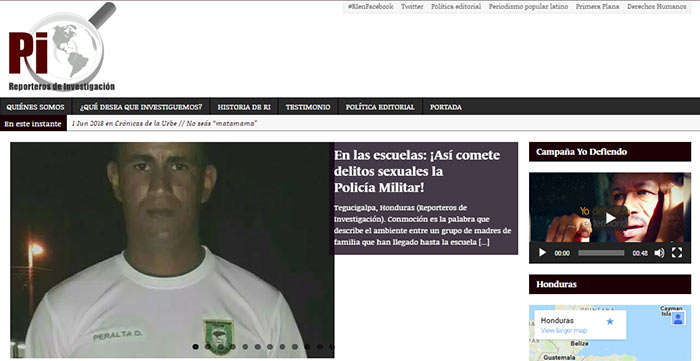[vc_row][vc_column][vc_single_image image=”100749″ img_size=”full”][vc_column_text]Two days after the publication of an investigation into alleged inappropriate behaviour by a member of a Honduran military unit involving young female students, digital newspaper Reportero de Investigacion was targeted with a misleading story that purported to be from the outlet.
The news outlet, which was founded by 2018 Freedom of Expression Awards Fellowship winner Wendy Funes, had posted an 8 June 2018 article which exposed how members of a military unit were going into schools, teaching children without parental consent or notification, collecting personal information and, in at least one case, texting sexually harassing messages under the guise of the “No Drugs, Live Better” programme. The Reportero de Investigacion article included screenshots of a text conversation between a mother and a military officer. The officer thought they were texting the woman’s daughter.
The publication drew a large amount of the attention in Honduras, which is one of the world’s most dangerous places to be a journalist.
Two days later, a faked article began appearing that used the Reportero de Investigacion logo and included screenshots from gang members who discussed the difficulties of distributing drugs, claiming they had less access after the military had begun its in-school training programme. The false article is being shared on WhatsApp groups among members of the law enforcement community in Honduras, Funes told Index on Censorship.
This is not the first time that fake news stories have been circulated in Honduras to discredit the work of investigative journalists and human rights activists and undermine their personal security.
For Funes, it is vital that the appropriate government agencies investigate these false publications. She said she will be addressing a complaint to the new Honduran Special Prosecutor for the Protection of Human Rights Defenders, Journalists, Social Communicators and Justice Operators, (FEPRODDHH), which has the responsibility for determining where the faked article purporting to be from reporterosdeinvestigación.com came from.
“For us it is necessary to carry out an investigation, although we do not have the certainty that it is a smear campaign against our newspaper, we believe that an investigation is urgent to determine the origin of the messages and the State has the tools necessary to do it.” Funes said.
Perla Hinojosa, fellowships and advocacy officer at Index on Censorship said: “It’s important to call out efforts to discredit the investigative work of journalists like Wendy. Even though this was not a direct physical threat, the spread of false information undermines Wendy’s news organisation, which seeks justice and identifies human rights abuses.”[/vc_column_text][/vc_column][/vc_row][vc_row][vc_column][vc_basic_grid post_type=”post” max_items=”12″ style=”load-more” items_per_page=”4″ element_width=”6″ grid_id=”vc_gid:1528734389898-5507b00f-068d-2″ taxonomies=”23255″][/vc_column][/vc_row]





